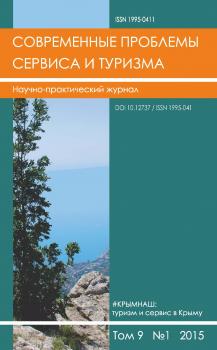from 10.06.2014 to 27.08.2017
Tver', Tver, Russian Federation
from 14.09.1936 to 16.10.2016
Tver, Russian Federation
from 17.10.2014 to 17.10.2016
Tver, Russian Federation
The concept of “ecological tourism” both in the world and in Russia has appeared in the second half of the twentieth century, although people traveled with natural-focused purposes, including around the protected areas, much earlier. The article presents several definitions of ecotourism, including the two given by the authors. The authors note that ecotourism can be developed in two ways: as a journey on any remaining natural areas or as tour, excursion exclusively within specially protected natural areas (SPNA). The second option is successfully developed in many Englishspeaking countries. The article confirms this fact using the original modern data on the dynamics of visits to the most famous national parks in the USA. Based on the analysis of literature and Internet sources it is concluded that the governance of the Russian Federation considers it necessary to develop eco-tourism in our country according to the second “North American” concept. In this case, the people attending the state protected areas – national parks and reserves with educational and recreational goals should be considered as eco-tourists. Based on this assumption the authors of the article give modern official data concerning the number of specially protected areas of different types in Russia as main destinations of ecotourism. The article presents the diagrams showing the quantitative characteristics of the infrastructure for ecotourists in specially protected areas: visitor centers, museums, ecological paths and routes. The dynamics of tourist arrivals in the reserves and national parks of Russia for the period 2001-2016 years is analyzed. In the final part of the article the main problems of eco-tourists recording are identified.
state reserve, national park, ecological tourism, ecotourist, specially protected natural territories.
1. Dolzhenko G. P. Opyt razrabotki klassifikacii sovremennogo rossiyskogo turizma // Trudy Mezhdunarodnoy turistskoy akademii. Vyp. 5. «Prioritety i perspektivy nauchnyh issledovaniy mezhdunarodnogo turizma v XXI veke». M., 2010. S. 59-69.
2. Dorofeev A.A. K voprosu ob opredelenii ponyatiya «ekologicheskiy turizm» // Turizm i regional'noe razvitie. Smolensk: Universum, 2002. S. 359-364.
3. Zorin I.V., Kvartal'nov V.A. Enciklopediya turizma: Spravochnik. M.: Finansy i statistika, 2000. S. 368.
4. Korostelev E.M. Ekologicheskiy turizm kak faktor regional'nogo razvitiya // Rossiyskiy zhurnal ekoturizma. 2013. №5. S. 3-9.
5. Korostelev E.M. Ekologicheskiy turizm na Severo-Zapade Rossii: problemy i perspektivy raz- vitiya // Stranovedenie i regionovedenie v reshenii problem ustoychivogo razvitiya v sovremennom mire: Mater. nauch. konf. SPb., 2010. S. 368-376.
6. Lapochkina V.V., Kosareva N.V., Adashova T.A. Ekologicheskiy turizm v Rossii: tendencii razvitiya // Mezhdunarodnyy nauchno-issledovatel'skiy zhurnal. 2016. Vyp. 5-1(47). S. 100-105. DOI:https://doi.org/10.18454/IRJ.2016.47.257.
7. Lukichev A.B. Kratkiy ocherk istorii ekoturizma // Rossiyskiy zhurnal ekoturizma. 2013. №5. S. 36-37.
8. Notov A.A., Dement'eva S.M., Pavlov A.V. Botaniko-geograficheskaya harakteristika flor lesnyh i bolotnyh kompleksov nacional'nogo parka «Zavidovo» // Vestnik Tverskogo gosudarstvennogo universiteta. Ser.: Biologiya i ekologiya. 2010. №18-18. S. 97-113.
9. Dorofeev A., Bogdanova L., Khokhlova E. Monitoring of eco-tourism areas in the national parks of Russia // Australian Journal of Scientific Research. 2014. No1(5). Vol. II. Rp. 697-704.





